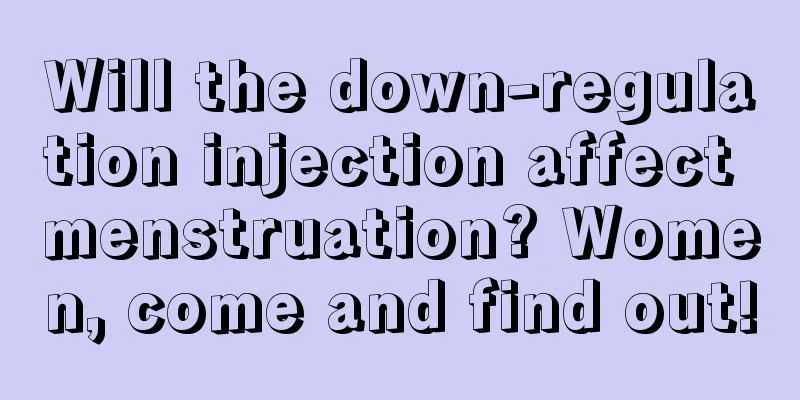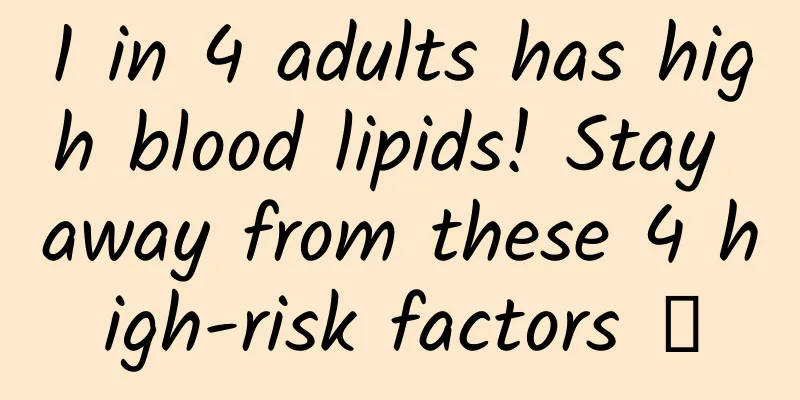Will the down-regulation injection affect menstruation? Women, come and find out!

|
Due to various reasons, some couples cannot have normal children, so they choose to do in vitro fertilization. In the process of in vitro fertilization, they usually encounter the procedure of down-regulation injection. The main purpose of the down-regulation injection is to regulate the pituitary gland, avoid spontaneous ovulation in women, and increase the number of follicles. So, will the down-regulation injection affect women's menstruation? 1. Will the down-regulation injection affect menstruation? This situation is likely to affect the normal menstrual period. For the time being, it is better to follow the doctor's advice, take medicine and observe the menstrual period. Suggestions: In normal circumstances, it is better to drink more water and rest and keep warm. At the same time, observe the secretions and go to the hospital in time to choose color ultrasound to observe the condition of the endometrium when necessary. Take the medicine on time according to the doctor's advice, pay attention to local hygiene and strengthen nutrition. 2. Will it affect ovulation induction if I haven’t had my period yet after taking the down-regulation injection for in vitro fertilization? The purpose of down-regulation in IVF is to down-regulate the pituitary gland, inhibit or reduce the occurrence of spontaneous LH peaks, and avoid spontaneous ovulation. It can actively determine the time of HCG administration and egg retrieval, utilize the short-term promoting effect of Gn secretion in the initial stage of medication, increase the number of follicles recruited, improve the synchronization of follicle development, and strive to obtain more synchronously developed mature follicles. Suggestions: Generally, it will not cause menstrual disorders. It is recommended that you can adjust your diet during the treatment period, requiring normal food, less fried and irritating food. It is necessary to add some vegetables and fruits, drink more water, and do outdoor sports to increase resistance. 3. Why is there still blood in the menstrual period after taking the down-regulation injection for more than ten days? Normal menstrual bleeding usually lasts for 3 to 7 days. If it exceeds 10 days, it can be considered as prolonged bleeding. Excessive menstrual bleeding can be caused by many reasons, the most common ones are: fatigue during menstruation, cold, endocrine disorders, IUD insertion, gynecological inflammation, uterine fibroids, blood disease, liver or kidney disease, endometrial abnormalities, etc. After the bleeding stops, it is necessary to check six sex hormones and B-ultrasound to find out the cause and then treat it symptomatically. Use hemostatic drugs when necessary. Pay attention to keeping warm and resting during menstruation. |
<<: Will smoking affect fertility for girls? This is what the experts say!
Recommend
Can being busy cure mental illness? What should I do if my wife's idleness affects my marriage?
In real life, many people fall into emotional anx...
Can polycystic ovary syndrome be cured?
Some girls do not pay attention to regular physic...
Can pregnant women eat spicy food? Will it affect the fetus?
When pregnant, expectant mothers can't help w...
Brown discharge after menstruation
The occurrence of menstruation is a relatively no...
I haven't had my period but I have brown discharge.
Menstruation, also known as period. What we are t...
Can I still eat bread that has sodium diacetate added to it?
now More and more types of bread Tempting aroma a...
If adverse reactions occur while taking statins, should I stop taking the medicine?
Statins are the "cornerstone" drugs for...
AppData: Ranking of social game vendors on Facebook platform in August 2011
Ranking of game manufacturers on Facebook platfor...
What are some tips for growing flowers and fertilizing them in life? What are the benefits of growing flowers?
Flowers and plants are also living things, and ma...
What should you pay attention to before pregnancy?
For a woman, the health of her baby is everything...
Black outer ring of labia minora
The labia are located inside the labia majora. Th...
Does riding a bicycle affect women's private parts?
Women who enjoy riding bicycles or exercise bikes...
Can pregnant women eat some leeks?
Because everyone wants to have a healthy and smar...
Pharmaceutical Technology Week | Use "whitening pills" when you get tanned? NO, NO, NO!
Author: Ma Shuangshuang, Chief Pharmacist, Pharma...
Can I take a bath during confinement?
Generally, women may encounter the question of wh...









